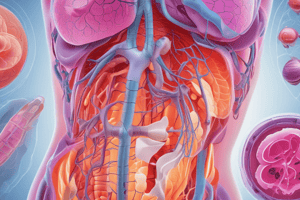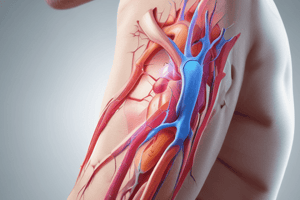Podcast
Questions and Answers
Allen’s Test assesses arterial blood supply in the ______.
Allen’s Test assesses arterial blood supply in the ______.
hand
Cullen’s Sign indicates internal hemorrhage causing ecchymosis around the ______ region.
Cullen’s Sign indicates internal hemorrhage causing ecchymosis around the ______ region.
umbilical
Turner’s sign is observed as grayish blue on the ______.
Turner’s sign is observed as grayish blue on the ______.
flanks
Murphy’s Sign is characterized by pain with palpation of the ______ area.
Murphy’s Sign is characterized by pain with palpation of the ______ area.
McBurney’s Point indicates RLQ pain, which is indicative of ______.
McBurney’s Point indicates RLQ pain, which is indicative of ______.
The Guthrie Test is a neonatal heel prick that tests for ______.
The Guthrie Test is a neonatal heel prick that tests for ______.
A positive Babinski Sign results in the toes to ______.
A positive Babinski Sign results in the toes to ______.
Beck’s Triad is indicative of ______ tamponade.
Beck’s Triad is indicative of ______ tamponade.
The Halo Sign appears as concentric rings of ______ and yellow border.
The Halo Sign appears as concentric rings of ______ and yellow border.
Endoscopic Retrograde Cholangio Pancreatography (ERCP) examines diseases of the pancreas, liver, and ______.
Endoscopic Retrograde Cholangio Pancreatography (ERCP) examines diseases of the pancreas, liver, and ______.
Flashcards
Allen's Test
Allen's Test
Evaluates hand blood supply by blocking radial and ulnar arteries; if hand turns pink after releasing ulnar, ulnar artery is working.
Cullen's Sign
Cullen's Sign
Ecchymosis (bruising) around the umbilical region, often signifies internal hemorrhage (especially pancreatitis).
Turner's Sign
Turner's Sign
Bluish discoloration on the flanks (sides), indicative of internal bleeding—often associated with pancreatitis.
Murphy's Sign
Murphy's Sign
Signup and view all the flashcards
McBurney's Point
McBurney's Point
Signup and view all the flashcards
Guthrie Test
Guthrie Test
Signup and view all the flashcards
Babinski Sign
Babinski Sign
Signup and view all the flashcards
Beck's Triad
Beck's Triad
Signup and view all the flashcards
Halo Sign
Halo Sign
Signup and view all the flashcards
ERCP
ERCP
Signup and view all the flashcards
Study Notes
Diagnostic Signs/Tests
- Allen's Test: Assesses arterial blood supply to the hand. A positive test indicates inadequate blood supply. Block both radial and ulnar arteries until skin is pale, then release ulnar. If hand turns pink, ulnar artery is working.
- Cullen's Sign: Internal hemorrhage causing bruising around the umbilical region, often seen in pancreatitis.
- Turner's Sign: Internal hemorrhage causing bluish discoloration on the flanks, often seen in pancreatitis.
- Murphy's Sign: Pain upon palpating the gallbladder area, indicative of cholecystitis.
- McBurney's Point: Right lower quadrant (RLQ) pain indicative of appendicitis. Left lower quadrant (LLQ) pain may indicate diverticulitis; ensure the patient hasn't ingested seeds, nuts, or peas. RLQ pain can also suggest appendicitis; assess for peritonitis.
- Guthrie Test: Neonatal heel prick to test for Phenylketonuria (PKU).
- Babinski Sign: Assesses nervous system function by stimulating the bottom of the foot. Negative: toes curl inwards. Normal in adults and children over 2 years, while abnormal in younger children. Positive: toes fan outwards. Abnormal in adults and children over 2 years, but normal in children under 2 years.
- Beck's Triad: Indicates cardiac tamponade – hypotension, jugular venous distention (JVD), muffled heart sounds.
- Halo Sign: Fluid from head injury often contains cerebrospinal fluid (CSF) and glucose, appears as concentric rings (bloody circle with yellow border).
- ERCP (Endoscopic Retrograde Cholangio Pancreatography): Procedure to examine diseases of the pancreas, liver, gallbladder, and bile ducts. NPO prior to procedure. Assess gag reflex and for signs of perforation post-procedure.
- Additional Notes: If chest pain is unrelieved by nitroglycerin, call 911 immediately. Keep medications in original containers and away from light. CT scan is the definitive diagnostic test for abdominal aortic aneurysm.
Studying That Suits You
Use AI to generate personalized quizzes and flashcards to suit your learning preferences.




